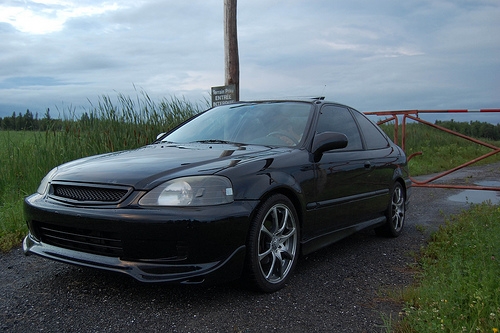
Starting problems in your Honda Civic can be frustrating to diagnose. When starting your engine, the starter, ignition system, fuel system and engine control computer must all work in harmony for the engine to fire. A malfunction in even one of the minor components in one of these systems can leave you stranded.
If the starter doesn't turn over when you turn the key, begin by examining the connections between the positive and negative battery cables and the battery terminals. Over time corrosion can develop between the cable ends and the battery terminal. If any is present it must be cleaned with a battery brush. Also tighten the retaining bolts that secure the cables to the battery terminals. Try turning on the headlights. If they seem dimmer than normal the battery needs to be charged.
In addition to checking the battery terminals and headlight brightness as described above, examine the negative battery cable's connection to the vehicle's body. If the retaining bolt is loose, tighten it, and if there is corrosion, clean it with a wire brush. Also check that the electrical wires connected to the starter are securely fastened. If none of the above resolves the problem, remove the starter and take it to an auto parts store to be tested. Replace as necessary.
Turn on the headlights and check for a dead battery. Begin by making the sure the bolts that secure the starter to the engine block are tight. If that is not the problem, remove the starter and examine the teeth on both the starter gear and the flex plate. If any are chipped or missing, the starter and/or the flexplate must be replaced.
Begin by checking to make sure there is fuel in the tank. If the fuel gauge or sending unit is malfunctioning, it may appear that there is gas in the tank when it is in fact empty. Remove the spark plugs (disconnect only one plug wire at a time to avoid mixing up the firing order) and check to see if the plugs are fouled or damaged. Check the spark plug gap using a gap gauge.
If the engine fires but will not run, it could be a result of vacuum leaks at the intake manifold. Tighten the bolts that connect the carburetor or throttle body to the intake manifold and the bolts that connect the intake manifold to the engine. On carbureted engines you can test if fuel is reaching the carburetor by disconnecting the fuel line at the carburetor and placing it into a fuel container. Have someone crank the engine while you look to see if fuel is coming out of the line. The fuel lines on fuel injected vehicles operate under intense pressure. Fuel pressure tests on fuel injected vehicles are best left to professional mechanics.